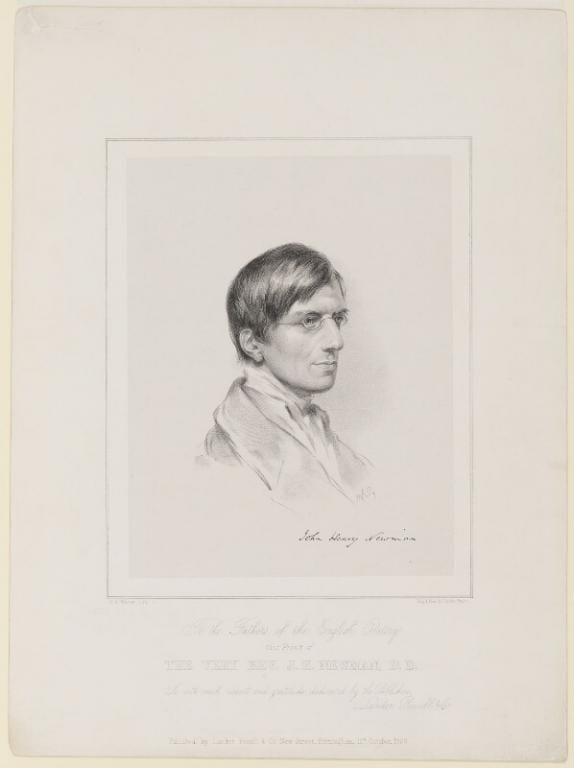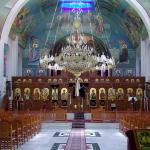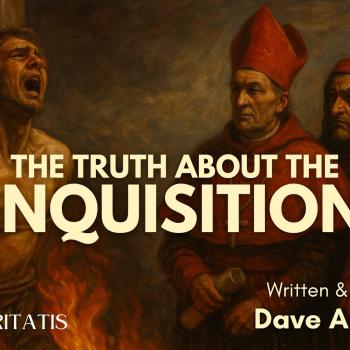
From: Lectures on the Present Position of Catholics in England (London: Longmans, Green and Co., 1918; originally 1851), Lecture IV: pp. 129-132-133, 136, 138. I’ve added some paragraph breaks.
*****
I allow there are true charges which can be brought against us; certainly, not only do I not deny it, but I hardly could deny it without heresy. I say distinctly, did I take upon me to deny everything which could be said against us, I should be proving too much, I should startle the Catholic theologian as well as Protestants; for what would it be but implying that the Church contains none within her pale but the just and holy? This was the heresy of the Novatians and Donatists of old time; it was the heresy of our Lollards, and others, such as Luther, who maintained that bad men are not members of the Church, that none but the predestinate are her members.
But this no Catholic asserts, every Catholic denies. Every Catholic has ever denied it, back to the very time of the Apostles and their Divine Master; and He and they deny it. Christ denies it, St. Paul denies it, the Catholic Church denies it; our Lord expressly said that the Church was to be like a net, which gathered of every kind, not only of the good, but of the bad too. Such was His Church; it does not prove then that we are not His Church, because we are like His Church; rather our being like the Primitive Christian body, is a reason for concluding that we are one with it. We cannot make His Church better than He made her; we must be content with her as He made her, or not pretend to follow Him.
He said, “Many are called, few are chosen;” men come into the Church, and then they fall. They are not indeed sinning at the very time when they are brought into His family, at the time they are new born; but as children grow up, and converts live on, the time too frequently comes, when they fall under the power of one kind of temptation or other, and fall from grace, either for a while or for good. Thus, not indeed by the divine wish and intention, but by the divine permission, and man’s perverseness, there is a vast load of moral evil existing in the Church; an enemy has sown weeds there, and those weeds remain among the wheat till the harvest. And this evil in the Church is not found only in the laity, but among the clergy too; there have been bad priests, bad bishops, bad monks, bad nuns, and bad Popes.
If this, then, is the charge made against us, that we do not all live up to our calling, but that there are Catholics, lay and clerical, who may be proved to be worldly, revengeful, licentious, slothful, cruel, nay, may be unbelievers, we grant it at once. We not only grant it but we zealously maintain it. “In a great house,” says St. Paul, “there are not only vessels of gold and silver, but also of wood and of earth; and some indeed unto honour, but some unto dishonour.” There are, alas, plenty of children of the Church, who by their bad lives insult and disgrace their Mother.
The Church, it is true, has been promised many great things, but she has not been promised the souls of all her children. She is promised truth in religious teaching; she is promised duration to the end of the world; she is made the means of grace; she is unchangeable in Creed and in constitution; she will ever cover the earth; but her children are not infallible separately, any more than they are immortal; not indefectible, any more than they are ubiquitous.
Therefore, if Protestants wish to form arguments which really would tell against us, they must show, not that individuals are immoral or profane, but that the Church teaches, or enjoins, or recommends, what is immoral or profane; rewards, encourages, or at least does not warn and discountenance, the sinner; or promulgates rules, and enforces practices, which directly lead to sin;—and this indeed they try to do, but they find the task not near so pleasant as the short and easy method of adopting strong, round, thorough-going statements, which are not true. . . .
[O]ne thing has to be examined, whether on the whole her influence and her action is on the side of what is wrong, or rather (as is the case) simply powerful on the side of good; one thing has to be proved, that the scandals within her pale have been caused by her principles, her teaching, her injunctions, or, which pretty nearly comes to the same thing, that they do not also exist, and as grievously (Catholics would say, they exist far more grievously), external to her. . . .
It is not what the Catholic Church imposes, but what human nature prompts, which leads any portion of her ecclesiastics into sin. . . . It is the world, the flesh, and the devil, not celibacy, which is the ruin of those who fall. . . .
If grievous sin is found in holy places, the Church cannot hinder it, while man is man: prove that she encourages it, prove that she does not repress it, prove that her action, be it greater or less, is not, as far as it goes, beneficial:—then, and not till then, will you have established a point against her.
For myself, my Brothers of the Oratory, I never should have been surprised, if, in the course of the last nine months of persecution some scandal in this or that part of our English Church had been brought to light and circulated through the country to our great prejudice. Not that I speak from any knowledge or suspicion of my own, but merely judging antecedently and on the chance of things.
And, had such a case in fact been producible, it would, in the judgment of dispassionate minds, have gone for nothing at all, unless there is to be no covetous Judas, no heretical Nicolas, no ambitious Diotrephes, no world-loving Demas, in the Church of these latter lays. Fraud in a priest, disorder in a convent, would have proved, not more, perhaps less, against Catholicism, than corruption in Parliament, peculation in the public offices, or bribery at elections tells against the British Constitution.
***
Related Reading
Sins and Sinners in the Catholic Church [1998]













